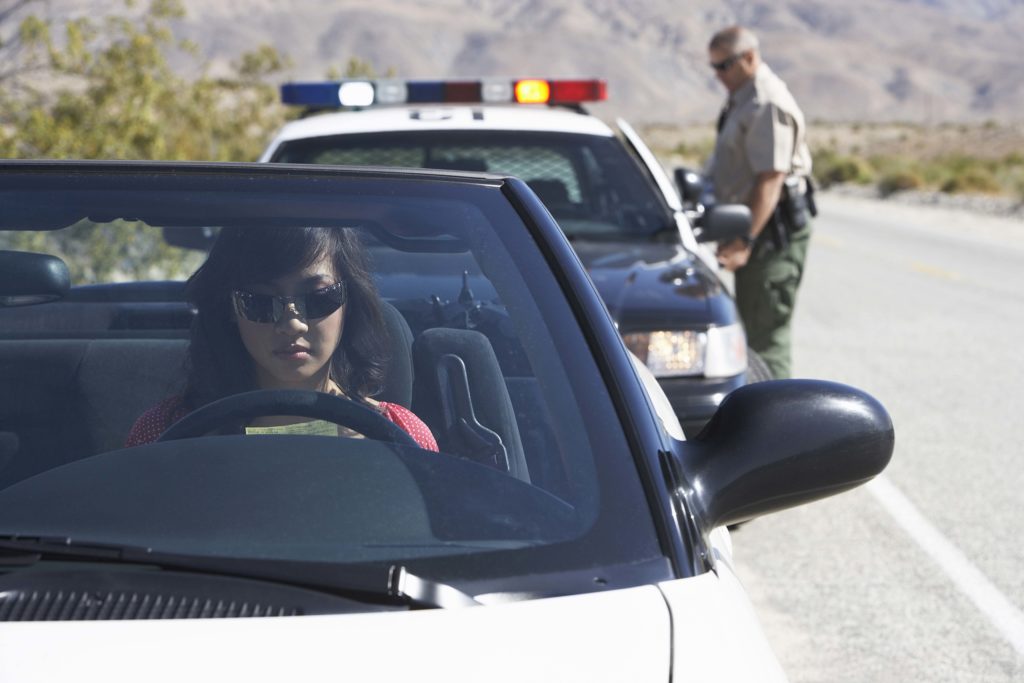There are probably a lot of things that go into a successful traffic stop besides your words. Make no mistake, your words extremely important. What you say, and even more importantly what you don’t say, can either act as an admission of guilt, a confession to the traffic charges as written or, even worse, as probable cause for a further search and possibly arrest.
When you realize that you’re being stopped
Let’s go back a couple of steps to when you’re first notified of the traffic stop, probably flashing lights, perhaps a siren; it’s a good idea to pull over as quickly and safely as possible. The police are not picky if it’s off the roadway and reasonably safe. The officer doesn’t want to follow you for several blocks while you find a safe place to park. Once safely stopped, roll down your window and place your hands on the steering wheel. It’s a good idea to allow the officer to see your hands. If it’s night, it’s not a bad idea to turn on your dome light to reassure the officer that you mean no harm.
You should not leave your vehicle unless you are told to by the police officer, so remain there until he arrives. Your car should be free of anything that may look incriminating such as empty bottles or anything else of interest such as drug paraphernalia. If it’s night, the officer is likely to have a flashlight and he won’t hesitate to shine it in the back seat and other areas. If the officer sees empty bottles or other questionable objects he may assume you’ve been drinking. By the time of the traffic stop, it is too late to clean it up.
When the officer arrives at your window
At this point, the officer arrives at your window. He will probably ask for your license and registration. It is a good idea not to retrieve your registration from the glove box until he tells you to, so he won’t think that you’re reaching for a weapon.
It is important that you be polite and respectful. Smile a lot. Do not leave the vehicle unless requested by the officer. He’ll probably also make some small talk, such as where you’re heading to or coming from. While this seems like friendly banter, he is gathering information about you that can be used for other charges. He may lead off with a question like, “Do you know why I stopped you,” or “Do you know how fast you were going?”
These questions are traps. It is important that you to resist answering these questions, if possible. If you feel you must answer to be cooperative, you should answer “No” to the question regarding why he stopped you, and you should answer simply “Yes” to the speed question. You do not need to elaborate. Your first reaction might be to say, “Yes, I was going XX mph,” or that you don’t know how fast you were going. You must resist this temptation. The first response, depending on the answer, may be an admission of guilt to a violation of the speed limit. If you answer, “I don’t know,” then his speed, the one that came from his radar system or another clocking mechanism will become the de facto speed and he can write the ticket at that speed, knowing that you have no evidence to contradict his clocked speed.
Realize that his questions are not friendly questions, but an attempt to gain a confession or at least “probable cause” from you that he can use for other charges, such as DUI. You do not have to answer these questions, although he will NOT warn you that anything you say can be used against you, yet it is true. And he will be keeping notes on your conversation, and it may be recorded via body cam or dash cam. You can politely decline to answer any other questions, although, that is a matter for you to decide at the time of the stop.
If you are asked to leave the car
Follow the officer’s instructions, but roll up your window, and lock the doors. Be calm, careful and avoid sudden movements. You should say that you do not consent to any search of your person or vehicle. This will require him to obtain a warrant to proceed with any vehicle search, and absent probable cause, he will not get one. However, you should follow the officer’s instructions.
Keep your cool
It is important that you not get rattled at the excitement of the traffic stop. You’ve been singled out and the lights are flashing and, if it’s night, he may have a flood light trained at the back of your car. There’s a lot going on that can disorient you and make you feel less than comfortable. It is a prime situation where mistakes can easily be made on your part.
Most drivers also feel a desire to cooperate with an authority figure, such as a police officer, but realize that he is not your friend at this point, and you need to minimize any further involvement to the best of your ability. You can say, “I refuse to answer questions,” but many feel this may just raise the officer’s suspicions.
Throughout the stop, let the officer do most of the talking. Respond to his requests in ways that will not incriminate you. Don’t interrupt him and avoid being belligerent or argumentative. While being polite, don’t give him anything that can be used against you. It’s his job to prove your guilt. If issued a citation, sign it per the officer’s request. This is not an admission of guilt, only an agreement to appear.
Ticket Busters can help
Hopefully, the traffic stop will be routine and you’ll be on your way shortly, perhaps with a ticket or other violation. Ticket Busters works with most courts in Clark County, Nevada. If you’ve received a ticket as the result of a traffic stop, call us at (702) 666-6666, today to discuss your case.



